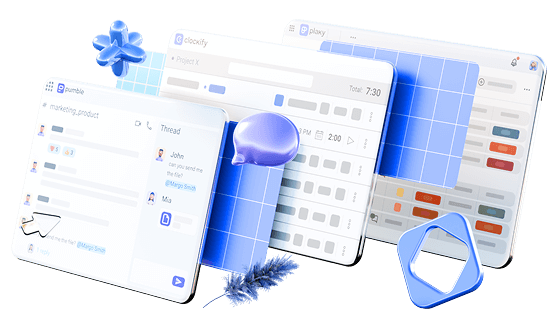Have you ever observed a person who’s so calm and collected, always ready for their next task, unbothered by issues at work, and thought — this could never be me? Well, it actually can! And, the key is — mindfulness.
By practicing mindfulness, you can become more focused and productive at work. On top of that, mindfulness can even help you improve your mental health and reduce chances of burnout and mental fatigue.
So, to help you fully grasp this concept, in this article we’ll cover:
- What mindfulness at work is,
- What the benefits of being mindful are,
- How to practice mindfulness, and
- The challenges to achieving mindfulness in the workplace.
What is mindfulness in the workplace?
Mindfulness is about being present in the moment. At the workplace, this usually means dedicating your full attention to the tasks at hand.
Due to the abstract nature of this term, we suspected you would need a bit more clarity on what being mindful at work is. So, we contacted mindfulness experts and asked them for their definitions of mindful work.
For mindfulness expert and meditation leader Anne-Marie Emanuelli, mindfulness is about being focused on your tasks:

“Mindfulness is paying attention to something intentionally and nonjudgmentally. Any activity can be done mindfully. In a work environment, this would translate as placing all of our attention and focus on the job we’re doing, noticing what it feels like, sounds like, looks like, etc. This allows us to be fully present in our work and daily activities.”
Moreover, ICF-certified coach specializing in transformation and identity reconnection, Kourtney Walker, believes mindfulness is the highest level of attentiveness:

“Mindfulness at work involves a conscious, presence-of-mind practice where individuals deliberately focus on one or more of their senses to enhance awareness. This practice aims to bring a heightened state of attentiveness and focus to the present moment, reducing distractions and promoting a deeper engagement with tasks and interactions.”
However, licensed therapist Kori Hennessy believes you don’t have to be hyper-focused on a specific assignment to be mindful:

“Mindfulness does not mean being hyper-focused on a single task, but it does mean you are able to attend to the task at hand with intention and awareness. At work, It often looks like slowing down to attend to a single task at a time. It might look like taking more breaks to breathe or stretching to bring more awareness to your body.”
Key benefits to workplace mindfulness
Why is it important to be mindful at work? Can workplace mindfulness make us more successful? Well, according to our experts, it can! Mindfulness could even help us prevent serious issues such as burnout and fatigue.
Let’s take a look at the essential benefits of mindfulness in the workplace our experts highlighted.
Mindfulness prevents distractions
Mindfulness could be the key to maintaining focus while at work. Emanuelli points out that mindfulness makes you more committed to your tasks:

“In the workplace, mindfulness would allow full engagement in a task, avoiding getting distracted by the mind’s preponderance to think, plan, analyze, and wander off.”
Mindfulness makes us more productive
Focusing and staying committed to your tasks can also make you more productive. Walker believes that a continuous practice of mindfulness in business makes us more relaxed and less prone to distractions. This, in turn, increases productivity:

“Over the long term, mindfulness has been shown to boost productivity by fostering a sustained focus and a calmer mind.”
Mindfulness builds resilience
Resilience is all about making us more adaptable to change. Building it enables us to readily take on challenges that may arise when we’re working.
Coach at Inner Work Matters, Christine Samuel, explains that mindfulness creates resilience by giving us clarity and composure:

“Mindfulness practices build resilience by teaching us to respond to challenges with clarity and composure. By fostering a nonjudgmental awareness of our thoughts and emotions, we develop coping strategies that help us bounce back from setbacks more effectively.”
Mindfulness allows for better communication
Emanuelli introduces the concept of mindful listening as a way for us to become better communicators at work. In simple terms, mindful listening is about listening to understand instead of listening to respond.
Emanuelli clarifies that mindful listening allows people around us to feel heard while enabling us to better understand their perspective:

“Mindful listening is key to understanding the desired outcomes, the speaker’s intention, and the steps to reach the goal of the job. Also, the person explaining wishes to be fully heard, and when we actively listen to what they are saying, we can show that what they are saying is important and, therefore, more fully grasp the project and the purpose of the meeting.”
Further reading
Becoming a better communicator at work goes a long way in ensuring good team collaboration. Here’s why team communication is important:
Mindfulness can reduce burnout chances
Being in touch with your thoughts and present in the moment makes us more in tune with our bodies. According to Samuel, this can help reduce burnout chances:

“Mindfulness helps us become more aware of our body’s signals, allowing us to recognize when stress or overwhelm is building up. By tuning into these cues, we can make proactive choices that support our well-being and prevent burnout before it escalates.”
Mindfulness could prevent mental fatigue
Walker believes multitasking can lead to mental fatigue. Since mindfulness enables us to focus on one task at a time, it can make us less prone to brain fog and fatigue:

“In the short term, mindfulness can significantly reduce brain fog and fatigue by counteracting our natural tendency to multitask — a practice our brains aren’t naturally suited for. This immediate benefit helps improve concentration and clarity, allowing employees to tackle their tasks more efficiently and with greater accuracy.”
Mindfulness makes us emotionally intelligent
Mindfulness is key to managing our emotions and understanding others’ viewpoints. According to Samuel, this makes us more emotionally intelligent:

“Practicing mindfulness enhances our emotional intelligence by helping us become more aware of our emotions and how they impact our actions. This awareness enables us to manage stress more effectively and navigate interactions with colleagues with greater empathy and understanding.”
How to practice mindfulness at work
Would you like to start doing some mindfulness exercises at work but have no idea where to begin?
Here are some easy-to-incorporate expert tips on how to be more mindful at work.
Tip #1: Be more intentional
The best way to start practicing mindfulness is by being more intentional about your tasks. Before setting our intention, Hennessy advises taking deep breaths:

“Before starting a new task or project, we can take a few mindful deep breaths and set our intention for a certain period. In this way, we remind ourselves to stay focused on the task at hand and also know we will have a break to attend to our body.”
In addition, Emanuelli encourages being intentional about every daily activity:

“Mindfulness is being intentional with our focus, and it can be used in any activity, from sitting down to a cup of coffee, writing an email, doing the dishes, or any project at work. To be engaged mindfully means to slow down, pay close attention to the task, and use our senses to be intentional about our work.”
Tip #2: Practice awareness
To help you become more aware of your surroundings, Walker has come up with some mindful exercises to try out.
The first one is all about practicing our observational skills by noticing a specific color:

“Choose a specific color and make a conscious effort to notice it throughout the day in your surroundings. This practice sharpens your observational skills and brings your attention back to the present moment.”
The second exercise incorporates sensory engagement by focusing on the sounds and feelings of daily activities:

“Pay attention to everyday activities, such as washing your hands. Focus on the temperature, texture, and sound of the water, and how it feels on your skin. This practice grounds you in the present moment.”
The last one is all about tactile awareness, which brings focus to our minds:

“During a tough meeting or stressful situation, gently touch one finger to another and notice the sensation of the friction or pressure. This small act can help center your mind and reduce anxiety.”on the job we’re doing, noticing what it feels like, sounds like, looks like, etc. This allows us to be fully present in our work and daily activities.”
Tip #3: Take mindful breaks
Taking breaks is a great way to regain your focus. But, as Samuel notes, those breaks have to be mindful:

“Schedule short breaks throughout your day to step away from tasks. Use this time for deep breathing, observing sensations, or taking a brief walk to refresh your mind and body.”
Psychotherapist Kristie Tse opts for scheduling frequent breaks to restore her productivity:

“I personally schedule brief pauses to reconnect with my breath, which helps me stay focused and present. These small, consistent practices can blend seamlessly into your routine, creating a more mindful and productive work environment.”
Tip #4: Practice mindful listening
As Samuel explains, mindful listening requires you to be fully present:

“During conversations with colleagues or clients, practice full presence and attentive listening. By staying mindful of their words and nonverbal cues, you enhance communication and foster deeper connections.”
For Emanuelli, mindful listening means refraining from planning our answers and concentrating on what somebody is telling us:

“When we are in a meeting with colleagues, or talking with a client, we can use mindfulness to listen actively to what the other person is saying, avoiding the tendency of our mind to plan what we will say next.”
Tip #5: Create a community at work
A good support system makes everything easier. That is why Samuel recommends finding like-minded colleagues and creating a mindfulness community you can share experiences and even organize corporate mindfulness activities with:

“Begin by bringing together like-minded individuals within your organization who are passionate about mindfulness to launch this initiative. Establishing a community centered around mindfulness fosters shared learning and mutual support. These individuals can play a key role in organizing mindfulness ‘Lunch and Learn’ sessions or other mindfulness initiatives, contributing to a culture of well-being and growth within the organization.”
Struggling with practicing mindfulness — now what?
In a world full of distractions, being present in the moment can be extremely difficult, and may even feel unnatural. A psychology researcher and coach, Dr. Robyne Hanley-Dafoe, believes that persistence eliminates the discomfort practicing mindfulness can bring:

“Bringing attention to the here and now and observing your thoughts, feelings, and experiences without judgment can feel unnatural and even discomforting to some at first. Yet, as with all new behaviors and habits we hope to integrate into our lives, mindfulness takes practice. And thankfully, practice makes it better.”
Hennessy agrees persistence is crucial for becoming more mindful at work. If you’re still finding it difficult to achieve, she recommends changing your work routine:

“Sometimes work requires hustle, or a problem comes up and we need to alter our routine. That can create an environment in which we can’t practice mindfulness. If that happens occasionally, it is fine. Just get back into your mindfulness routine as soon as you can. If it happens a lot in your work, it is a sign to take a look at what is contributing to the difficulty in practicing mindfulness and evaluate if the work environment can be altered to promote a healthier environment.”
Lastly, Tse warns that mindfulness can sometimes bring underlying mental health issues to light. Thus, it should be combined with other therapeutic strategies:

“Mindfulness isn’t a cure-all and can sometimes magnify underlying issues if not combined with other therapeutic approaches. For instance, clients with severe trauma may find mindfulness practices triggering without proper guidance. Personal experiences have shown that while mindfulness is beneficial, it should be integrated with tailored strategies and professional support to address individual needs fully.”
→ Note: If you’re struggling with your mental health, you should consult a licensed therapist or a psychologist.
Further reading
Looking to make mindfulness a new habit? Learn how to use habit stacking to inspire new behaviors:
Mindfulness can make you more resilient and productive at work
As it makes us more in tune with our bodies, mindfulness sounds like a great solution to our focus and productivity problems. But, we have to remember that it’s not a cure-all for our mental health.
Still, coupled with therapy and a good support system, it can bring us more peace and make us more productive.
Bringing mindfulness into our lives is a long-term commitment that can be challenging at times. On the upside, as Samuel explains, the only obstacle in your mindfulness practice is your belief that you can’t do it:

“The only limitation I see lies in the mindset or beliefs surrounding mindfulness, often assuming it’s something only experts can do. Mindfulness is a fundamental human capacity that we can all cultivate with practice. Initially, we may need guidance to understand it, but ultimately, it becomes a personal practice of self-discovery and growth.”




